 Petzlover
Petzlover Carlin Pinscher is originated from France but German Coolie is originated from Australia. Carlin Pinscher may grow 27 cm / 10 inches shorter than German Coolie. Carlin Pinscher may weigh 18 kg / 39 pounds lesser than German Coolie. Carlin Pinscher may live 3 years less than German Coolie. Carlin Pinscher may have more litter size than German Coolie. Both Carlin Pinscher and German Coolie requires Low Maintenance.
Carlin Pinscher is originated from France but German Coolie is originated from Australia. Carlin Pinscher may grow 27 cm / 10 inches shorter than German Coolie. Carlin Pinscher may weigh 18 kg / 39 pounds lesser than German Coolie. Carlin Pinscher may live 3 years less than German Coolie. Carlin Pinscher may have more litter size than German Coolie. Both Carlin Pinscher and German Coolie requires Low Maintenance.
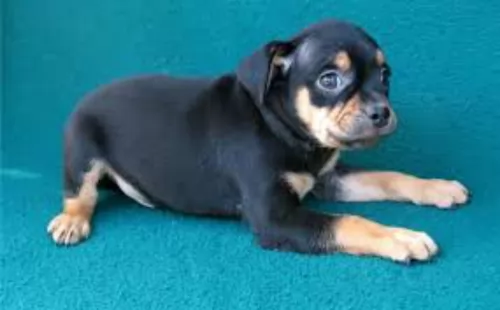 There are conflicting views as to where the Carlin Pinscher hails from, with some reports saying France and others the USA. The names of some breeders suggest it could be France.
There are conflicting views as to where the Carlin Pinscher hails from, with some reports saying France and others the USA. The names of some breeders suggest it could be France.
The dog hasn’t got a long history, being developed only in the early 1900s. Two breeders, Morgan and Buenafe left their Miniature Pinscher with a Pug owner for a while and on return discovered that the dogs had mated, producing puppies which looked like miniature Rottweilers.
It was in 1998 that a breeding program began and a Boxer was also brought into the mix to improve the characteristics of the dog. The dog is still being developed and isn’t recognized by the major kennel clubs.
 The German Coolie is misnamed as it is an Australian bred dog and often called the Australian Koolie or Coolie. This Australian breed is more often just called a Coolie. The breed is a typical herding breed and a working dog that needs a job all the time. They have been a favorite of Australians since the late 1800’s when local dogs were bred with British working dogs.
The German Coolie is misnamed as it is an Australian bred dog and often called the Australian Koolie or Coolie. This Australian breed is more often just called a Coolie. The breed is a typical herding breed and a working dog that needs a job all the time. They have been a favorite of Australians since the late 1800’s when local dogs were bred with British working dogs.
Although all Coolie’s are not the same. Within the breed there is a lot of variation. This is because the Coolie was bred individually for different regions in Australia. In a very different writing the Koolie Club of Australia does not define the Coolie breed on confirmation as all other purebred dogs are defined. Instead the Coolie is defined by ability to work. In light of this most Coolie breeders state that the Coolie is a breed and the variations you see among regions are types within the breed.
As a herding dog, the Coolie brought a lot of skill to the Australian farmers and sheep herders. The Coolie will round up the sheep and bring them back to their enclosure at the shepherd’s command. They are upright, silent, working dogs. Not only do they herd sheep they are important at sheering to “cut out” the sheep or assist in the close quarters of lambing.
In Queensland North and New South Wales, the Coolie is medium boned, tall and agile ready to herd cattle over a long stretch of miles. In the Snowy Mountains of New South Wales and the Hunter Valley Region, the Coolie is shorter and thicker in order to be able to get cattle that are lying low out from the gullies and dense bush. The Coolies found in Victoria are the smallest of all.
No matter where they live and work, the Coolie is bred to help the workers there, the farmers, the stockman, and the grazier. All Coolies are adaptable and very agile. They all have a strong willfulness to accomplish what they are asked to do. The ancestors of these various Coolie was the British Collie – a smooth coated, blue merle. This Collie was crossed with the Black and Tan Collie from the Scottish Highlands. It is believed that these are the same Collie breeds that came to Australia to create the Heeler.
The name may come from the German immigrants working in South Australia and unable to pronounce Collie incorrectly they called the dogs German Coolies. There is also a fraction of German breeders who believe that the German Tiger dog was brought to Australia in the 18th century and then when the Collies came they were bred together. Many Coolie breeders have records showing that the breed has been in Australia for at least 160 years. It is also believed that the Border Collie and Kelpie (Blue Heeler) were mixed into the breed at sometime as well.
No bench standard exists for the German Coolie even though there is the Koolie Club of Australia. The mission of the club is to protect, preserve and promote the breed. The Australian Sporting Register was recognizing the Coolies in 2004. They are eligible to participate in the Australian National Kennel Council sanctioned sporting trials. They participate in Queensland, New South Wales and Victoria through the individual states sporting register. Here they participate in herding, jumping, obedience, agility and tracking.
Several other recognitions as a herding breed soon followed. The Australian Shepherd Club of America, the American Herding Breed Association, were followed by recognition from others as well. They are not recognized by the American Kennel Club (AKC).
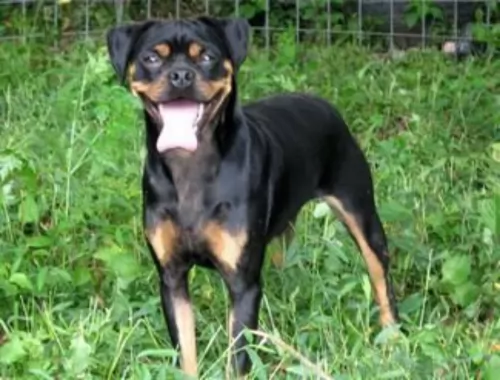 The Carlin Pinscher has been developed to be a social and loving companion. Started as a cross between a Miniature Pinscher and Pug, other breeds have also been brought in. He still has varied appearances, often looking like a tiny Rottweiler but also looking like anything between the Miniature Pinscher or the Pug.
The Carlin Pinscher has been developed to be a social and loving companion. Started as a cross between a Miniature Pinscher and Pug, other breeds have also been brought in. He still has varied appearances, often looking like a tiny Rottweiler but also looking like anything between the Miniature Pinscher or the Pug.
This is a small sized dog standing at anything from 27- to 33 cm and weighing 5 or 6kg. The body is compact with sturdy legs coming from the Pug side. The skull is a dome shape, the ears can be erect or floppy and unless the tail is docked it can be long, curling somewhat over the back. The coat is short and smooth and comes in shades of tan, brown and black.
The Carlin Pinscher is small but with a strong personality, being gentle and sweet in nature. He promises to be a loyal and affectionate companion for his human family, loving to be involved in all their activities.
He is an energetic, playful little dog and also intelligent, so apart from a walk and ball games, he’ll need some toys for indoors too that can provide physical- and mental stimulation. With early training and socialization, the Carlin Pinscher is a good friend of children and he will get on well with other pets in the house too. He is a small dog so children should be supervised and taught to handle him with gentleness and kindness.
 With their strong ancestry among the family of collies and herders, the German Coolie shares the look of collies and shepherds. Even though they differ from region to region and there is no actual standard, they are medium sized dogs with blue or brown eyes or even one of each. The ears are folded over on top when relaxed but they are rigid and straight when he is more alert. The nose is either chocolate or red depending on the color of their coat.
With their strong ancestry among the family of collies and herders, the German Coolie shares the look of collies and shepherds. Even though they differ from region to region and there is no actual standard, they are medium sized dogs with blue or brown eyes or even one of each. The ears are folded over on top when relaxed but they are rigid and straight when he is more alert. The nose is either chocolate or red depending on the color of their coat.
They can have either a long, medium or short coat but most owners want the short coat that is smooth as well. The coat can be one color – red/chocolate or black; Bi – red/white or black/white; Tri – solid black or red with white and brown; Tri merle -merle with white and brown; Merle – red merles and blue merles. Regardless of color, the German Coolie has the look of a collie or German Shepherd.
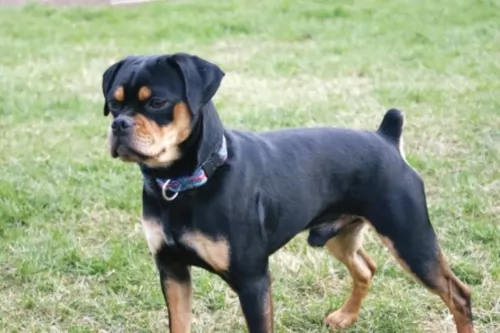 The Carlin Pinscher makes an ideal little pet and he will be content to live in a small home in the city or in the country, just so long as he is with an owner who loves and cares for him. They are balanced, easy-to-get-along-with dogs, being even-tempered, playful and outgoing.
The Carlin Pinscher makes an ideal little pet and he will be content to live in a small home in the city or in the country, just so long as he is with an owner who loves and cares for him. They are balanced, easy-to-get-along-with dogs, being even-tempered, playful and outgoing.
He is active, intelligent, strong-willed, stubborn and brave. It is true that people who have kept mixed-breed dogs rave about them. Certainly mixed breed dogs have earned themselves a reputation for being superb family pets. They’re healthy, feisty, quaint and entertaining.
These days many mixed breeds are no longer pavement specials but part of careful breeding, such as with the Carlin Pinscher. He is full of personality and makes a great family pet, getting along with other animals and also being good around children.
 Yes, they can be very friendly with children is they are socialized and supervised.
Yes, they can be very friendly with children is they are socialized and supervised.
They have enough stamina to work for 14 hours a day.
They are very adaptable. They can be calm and steady when working a mother and baby lamb and then be able to forcefully move steers, bull, rams or weathers.
The breed is highly intelligent, and their learning ability is excellent because they want to please you.
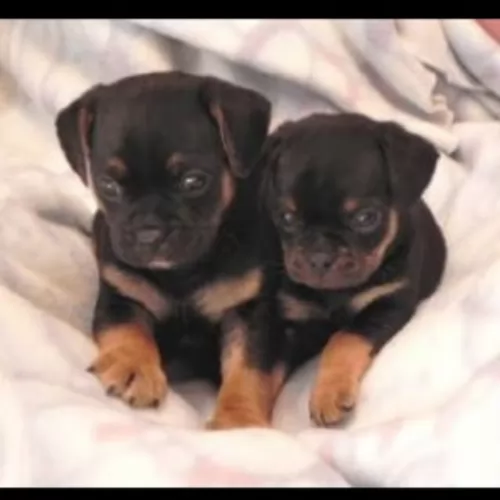 The Carlin Pinscher is a feisty little dog who can live to be up to 13, 14 or 15 years of age. He is a fairly healthy breed too, but there will always be some issues that the Carlin Pinscher might be prone to. Typical dog ailments include eye problems, hip dysplasia, liver problems, skin- and dental problems.
The Carlin Pinscher is a feisty little dog who can live to be up to 13, 14 or 15 years of age. He is a fairly healthy breed too, but there will always be some issues that the Carlin Pinscher might be prone to. Typical dog ailments include eye problems, hip dysplasia, liver problems, skin- and dental problems.
All liver problems with a dog are serious and will need veterinary intervention. A noticeable symptom of liver disease is jaundiced yellowing of the white of the eye. You might even see a yellowing on the underside of the ear flap. Your pet will have loss of appetite, constipation as well as highly colored urine.
 This is a relatively healthy breed without many genetic disorders found in purebreds due to the 160 years they have spent fairly isolated and allowing natural selection to take its course.
This is a relatively healthy breed without many genetic disorders found in purebreds due to the 160 years they have spent fairly isolated and allowing natural selection to take its course.
In Merle dogs there can be deafness and/or blindness. If you breed a solid to a merle you can eliminate that.
These are not inherited but rather acquired due to the immense amount of jumping and running.
Rare but it does occur and can be fatal if not treated
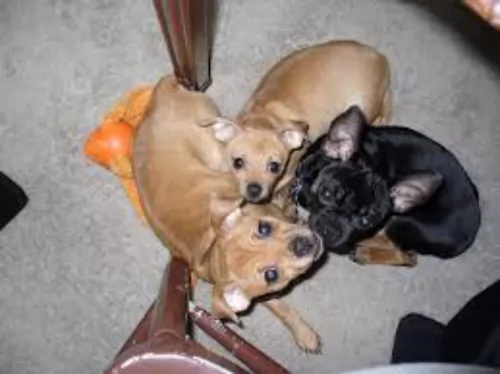 With his short, smooth coat, the Carlin Pinscher is a low to moderate shedder who is easy to maintain. The short coat will simply need a brush-down twice a week to rid him of loose hairs. If he is dusty, you can wipe the coat down with a warm, damp cloth.
With his short, smooth coat, the Carlin Pinscher is a low to moderate shedder who is easy to maintain. The short coat will simply need a brush-down twice a week to rid him of loose hairs. If he is dusty, you can wipe the coat down with a warm, damp cloth.
Every dog, large or small needs a balanced diet that consists of proteins, fats, vitamins, minerals and carbohydrates. A well balanced diet keeps a dog healthy but also in shape. A dog requires certain ingredients in its diet, depending on age, activity levels, size and stage of life such as pregnancy or illness.
For starters, dogs need fresh, cool water at all times. If you’re confused about dry kibble or semi-moist dog food for instance, speak to your vet about what your Carlin Pinscher needs. It’s always good to give your pet variety, so mixing in some rice, vegetables and meat will be wonderful for your pet as will some raw meat from time to time.
 Break meals into 3 a day feeding a high quality dry puppy food designed for dogs of his size. 11/2 to 2 cups per day.
Break meals into 3 a day feeding a high quality dry puppy food designed for dogs of his size. 11/2 to 2 cups per day.
Break meals into 2 a day feeding a high quality dry adult food designed for dogs of his size.
Traditionally good health. Great energy, intensity and devotion to work and owner.
This is an energetic dog that loves to work and needs to work. Regular routine exercise is needed daily. He needs to be stimulated mentally and physically. Find him a job. Make sure he knows what you want him to do. They work well with a human partner in games such as agility, tracking, flyball and herding. They need a large yard and a lot of play time. They are not couch potatoes and would be unhappy if they were stuck in a house or apartment